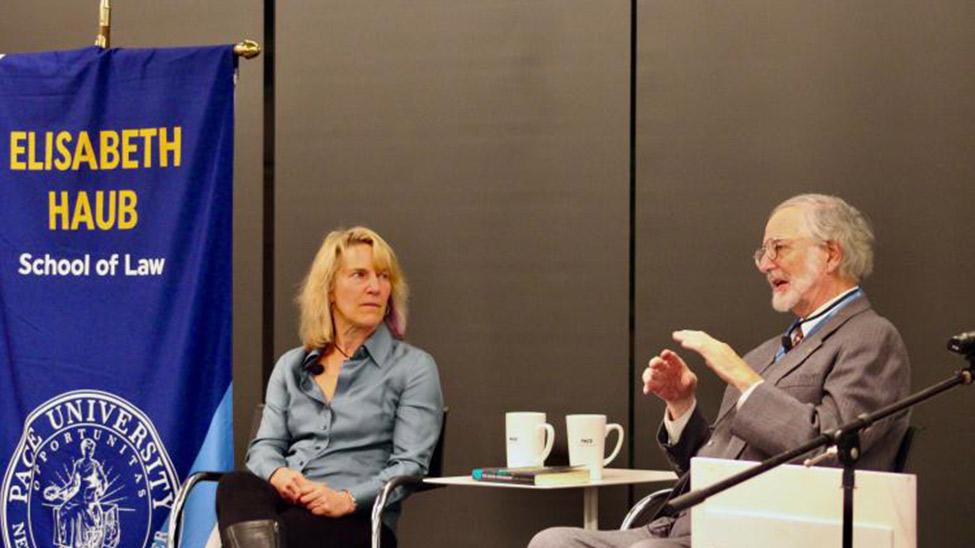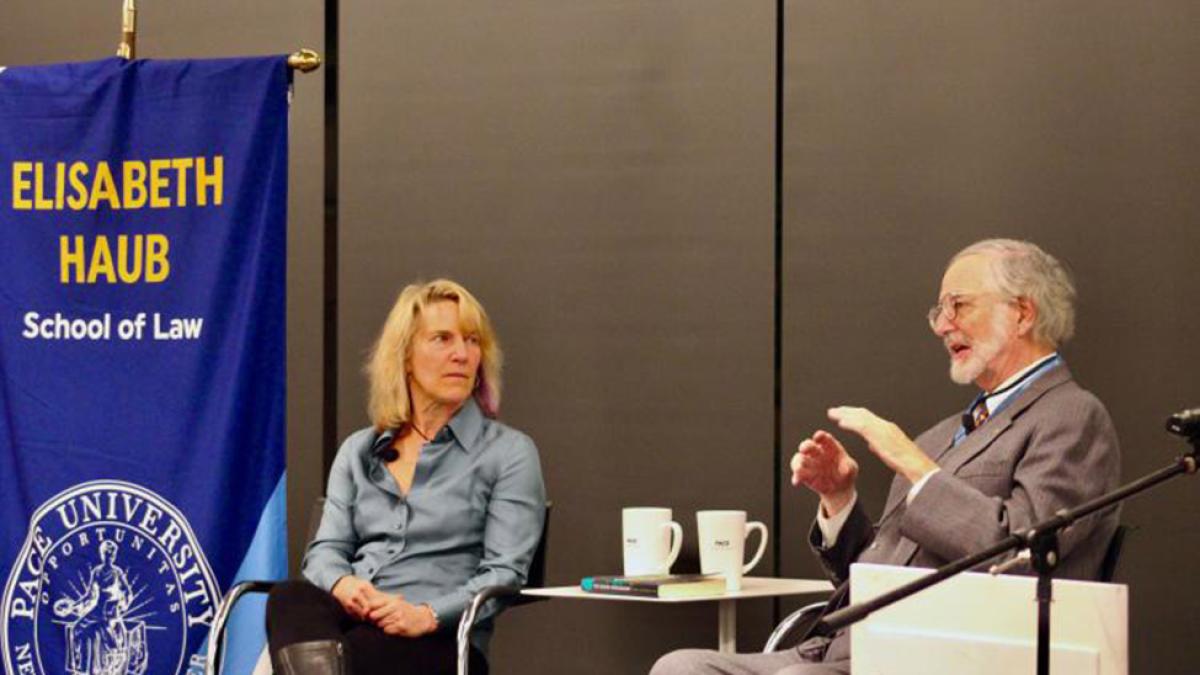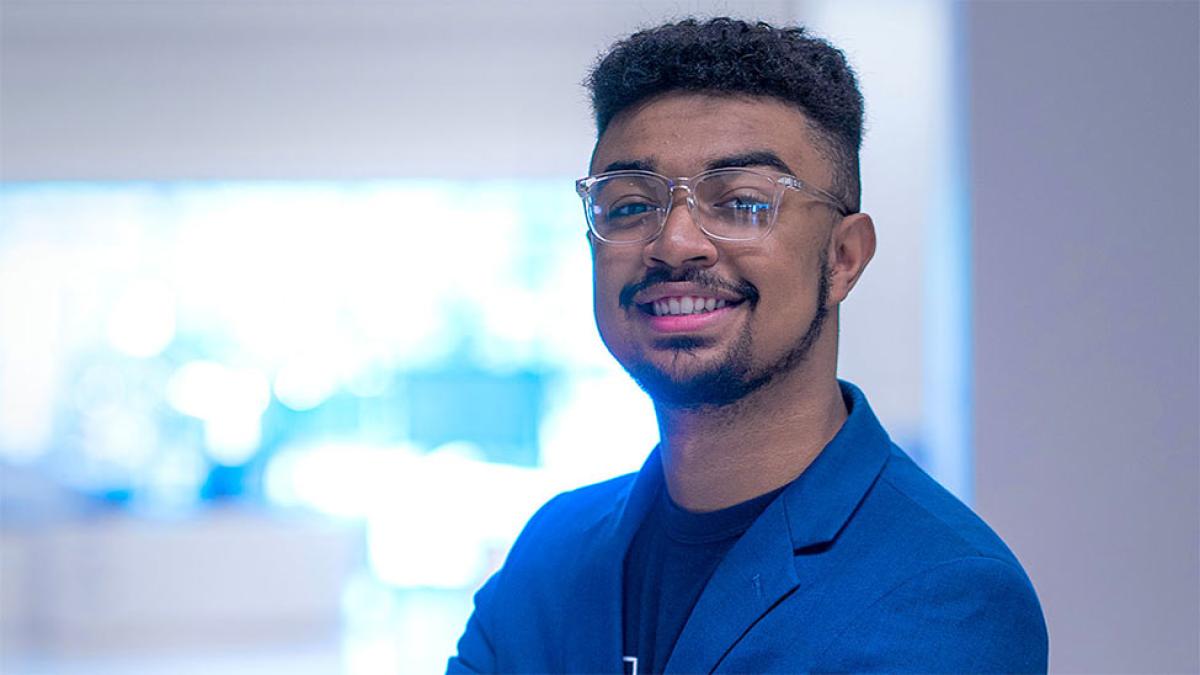
Professor Bennett Gershman on SCOTUS Ethics
Pace University, Elisabeth Haub School of Law Professor Bennett Gershman discusses gaps in the code of ethics for Justices of the Supreme Court of the United States and the interest among lawmakers for a broader Justice Reform Bill in Congress on the Newsy Morning Show.
Elisabeth Haub School of Law Professor Bennett Gershman discusses gaps in the code of ethics for Justices of the Supreme Court of the United States and the interest among lawmakers for a broader Justice Reform Bill in Congress on the Newsy Morning Show.
Lawyers Slam Donald Trump’s Video Deposition In His Latest Lawsuit: ‘Who Does He Think He Is?’
“He is not loved in the Bronx” “I’m a civil rights lawyer. If I can get a case into the Bronx, I’ll move heaven and earth,” Randolph McLaughlin, Pace University law school professor and co-chair of Newman Ferrara LLP’s civil rights practice group told The Guardian. “Bronx juries, they engage in Robinhood-ism. They take from the rich and give to the rest of us – their verdicts are always generally right at the ceiling.”
Elisabeth Haub School of Law at Pace University Hosts Green Amendment Book Launch with Author and Alumna Maya K. van Rossum
The Elisabeth Haub School of Law at Pace University hosted the launch of author and alumna Maya K. van Rossum’s book, The Green Amendment: The People's Fight for a Clean, Safe, and Healthy Environment, on Pace University’s New York City campus on Thursday, October 27. In this new edition of her book, officially released November 1st, van Rossum presents her radically simple plan for a green future: bypass local laws and turn to the ultimate authority—our state and federal constitutions—to ensure we have the right to a healthy environment. Author Maya K. van Rossum was joined by her former law school professor, Nicholas A. Robinson, a renowned scholar and pioneer in the field of environmental law, who led an insightful and engaging discussion focusing on the roadmap van Rossum outlines in her book for a healthier world. The event was attended by influential environmental law experts and eco-advocates.


The Elisabeth Haub School of Law at Pace University hosted the launch of author and alumna Maya K. van Rossum’s book, The Green Amendment: The People's Fight for a Clean, Safe, and Healthy Environment, on Pace University’s New York City campus on Thursday, October 27. In this new edition of her book, officially released November 1st, van Rossum presents her radically simple plan for a green future: bypass local laws and turn to the ultimate authority—our state and federal constitutions—to ensure we have the right to a healthy environment. Author Maya K. van Rossum was joined by her former law school professor, Nicholas A. Robinson, a renowned scholar and pioneer in the field of environmental law, who led an insightful and engaging discussion focusing on the roadmap van Rossum outlines in her book for a healthier world. The event was attended by influential environmental law experts and eco-advocates.
“The reason why I think we need a constitutional green amendment in every state constitution across the United States of America, and ultimately, at the federal level, is because the way our U.S. system of laws was written, and the way it has been increasingly implemented overtime, is it is really focused on legalizing environmental pollution and degradation through reviews and permits,” said van Rossum. “It’s not really focused on preventing harm in the first place.” Van Rossum is founder of Green Amendments For The Generations, a national nonprofit organization dedicated to inspiring a movement to amend state constitutions to recognize and protect environmental rights on par with other inalienable civic and political freedoms. She is also the Delaware Riverkeeper, leading the regional advocacy organization, the Delaware Riverkeeper Network, for over 27 years.
“The magic I see happening here is that now through states adopting the green amendment, we are basically taking a watershed, an interstate watershed that happens to have a compact and breathing into it a high obligation to protect, not just the water, but the environment as a whole,” Professor Robinson shared.
Watch the book talk below or learn more about the book at For The Generations
About Green Amendments For The Generations (GAFTG) is a non-profit environmental advocacy organization dedicated to inspiring, supporting, and enforcing constitutional Green Amendments - self-executing and enforceable environmental rights amendments that protect the right to clean air, pure water, a stable climate, and healthy environments - throughout all fifty states and ultimately at the federal level. GAFTG is currently working with communities in over a dozen states, including New Mexico, New Jersey, Delaware, Washington, Maine, and Hawaii, among others. GAFTG has increased the enforcement of Green Amendments in Pennsylvania, New York and Montana, the only 3 states with Green Amendment protections currently in place. To learn more, visit For The Generations.
Q&A with Nicolina Barone '24
Nicolina Barone '24, Writing and Cultural Studies, who published a book that was ranked among Amazon's Top 30 New Releases in Poetry, relishes the small liberal arts feel of Dyson, which has provided close connections with faculty and countless opportunities to get involved.


How did you become interested in pursuing a major in Writing and Rhetoric?
Writing and reading have been part of my identity since the earliest stages of my life. Words bring people together, connecting us through our experiences, and allowing us to understand that we are never truly alone in our thoughts and emotions. I always knew that my future career would involve working in the literary world.
Why did you choose to attend Pace?
I chose Pace because the MS in Publishing program was among the top five in the country at the time of my application and this seemed like the perfect way to get my foot in the door and learn more about a career in writing and editing. I plan to start the combined degree program this spring 2023 and graduate in 2024.
What have your experiences been like with the Writing and Cultural Studies Department? Have certain faculty members been instrumental in your academic journey?
The advantage of being part of a small liberal arts college was that I could make lasting and impactful relationships with my professors, and I have had so many positive experiences with those in the Writing and Cultural Studies Department.
The first professor I met who only furthered the idea that I chose the right major was JoAnn Schlesinger. I have taken three classes with her at Pace, and we developed a bond outside of the classroom as well. One of my essays from her class won the Writing and Cultural Studies Department Writing Award, and she has given feedback on the novel I hope to publish, which helped me win the Billie and Curtis Owens Fiction Award for the first 25 pages of the novel.
Kate Mulhollem was also a fundamental faculty member in my time here at Pace. When I first began working in the Learning Commons as a Writing Center consultant, Kate was my boss. She gave me the first job I have ever been fully excited about and interested in. I loved watching the way she worked with students and the techniques she used to tutor, and I truly learned a lot from her and ways to implement it in my own tutoring sessions.
Additionally, Dana Cadman has been another important faculty member, as the faculty advisor of CHROMA, Pace’s literary and arts journal, of which I am president and managing editor. My goal has been to get CHROMA on the map and ensure that everyone on campus knows about our club and wants to get involved, and she has assisted me every step of the way, ensuring we create an amazing, inclusive community of creatives on campus. Dana will also be assisting me as my advisor for my Honors Creative Thesis which I will be presenting this spring 2023. I am so excited to have such a talented writer and professor help me along the way!
I would also like to highlight that Rob Mundy and Bette Kirschstein have also been instrumental in my academic journey in countless ways.
The advantage of being part of a small liberal arts college was that I could make lasting and impactful relationships with my professors, and I have had so many positive experiences with those in the Writing and Cultural Studies Department.
You’ve recently had an internship at WebMD. What was your role and what has this experience been like for you?
My experience as an editorial intern with Krames, a subsidiary of WebMD, was absolutely amazing, as it single-handedly sparked my interest in a career in medical writing and editing. My role was to edit health, wellness, and medical content for tone, style, reading level, and flow, as well as ensure accordance with the client’s style guide. I also carefully fact-checked medical research-based content against approved sources and wrote original content for a series of topics including patient education materials. It was an extremely gratifying experience to see the assignments I had worked on become publications.
What activities and organizations, if any, have you been involved with as a student?
I am the managing editor and president of CHROMA, Pace’s literary and arts magazine, after first serving as a writer and poetry editor. I also have been involved in writing and editing for the Pace Chronicle and HerCampus. In addition, I am a mentor for the Pforzheimer Honors College (where I also serve as secretary on the council), a participant in the Setter’s Leadership Program and the National Society of Leadership and Success, and a Writing Center consultant for the Learning Commons. Further, I am an advocate for Colleges Against Cancer and helped run the Relay for Life last year.
Are there any challenges you have overcome, that you are proud of and would like to share?
After the ending of two romantic relationships, I felt as though I had lost myself and who I was. Instead of letting the pain consume me, I used it as a drive to chase the dream I had wanted to achieve my entire life: publishing a book. I combined three years’ worth of writing to create a poetry book, Serendipity, and then went on to self-publish it on Amazon. I wrote, formatted, edited, and published this book that went on to sell hundreds of copies. Upon release, it ranked on Amazon’s Top 30 New Releases in Poetry and Top 10 in the Death, Grief, and Loss genre. Publishing my book taught me that I can use pain as a motivation to succeed, grow, and become a better version of myself. My book not only helped me and my own healing process, but was able to help so many others who had gone through similar experiences. I even planned, hosted, and read pages of my book at a signing in Hug a Mug Café in Pompton Lakes, New Jersey.
What would you like to do upon graduation/what are your career goals?
I plan to start the five-year Master’s in Publishing program this spring and, ultimately, work as a medical writer or editor. I also plan to pursue writing and publish a romance novel.
What advice, if any, would you like to give to our current students?
Follow your passion and dreams. Throughout the years, I have received a fair share of feedback on my choice of a major, but that has never stopped me from pursuing my dream. Students must realize that a dream can only be achieved through the perseverance of effort. We are in charge of our own lives, and if there is one thing you can control, it is how hard you work and how badly you want it.
More Student Stories
Brooke Lyn Sicignano '25 has been acting since she was six years old. Now, through the Acting—International Performance Ensemble program, she's developing collaborative skills, exercising creative abilities, and waking up each day excited to learn more.
"To be able to share the stage with my classmates and living in New York City is truly a blessing. Being taught by the best of the best is truly an honor," said Victoria Beaudion '23, BFA Commercial Dance.
Jeremiah Williams '23 found his place on campus within the political science department. He cites courses taught by President Krislov and Matthew Bolton as influential in his journey to understanding the political world.
'Who does he think he is?': Legal analysts predict Trump's video deposition in Bronx trial will infuriate jurors
According to Randolph McLaughlin, Pace University law school professor, Bronx juries love sticking it to the rich and there is not a lot of love in the borough for the former president. “I’m a civil rights lawyer. If I can get a case into the Bronx, I’ll move heaven and earth. Bronx juries, they engage in Robinhood-ism. They take from the rich and give to the rest of us – their verdicts are always generally right at the ceiling,” he explained. "There’s no limit in the Bronx. They love to give money to the people. Donald Trump, as much as he is loved in certain corners of the country, he is not loved in the Bronx.”
Wisconsin regulators should look to Iowa for third-party solar model, advocates say
“Iowa is still very much a utility-dominated state with a vertically integrated utility structure, and with less than 2% of generation from distributed resources,” said Karl Rábago, an energy consultant based at Pace University School of Law, testifying on behalf of the advocacy group Vote Solar in one of the pending cases. “Moreover, since the 2014 court decision, I am not aware of movement in the state toward deregulation or retail choice.”
Jury selection to begin in New York City Trump Tower protest lawsuit
“If jurors can take time out of their busy days to sit in judgment, you can’t take time out of your busy day?” McLaughlin said of panelists’ potential sentiment. As far as the instruction goes: “I don’t think it’s going to carry much weight. Jurors, inside themselves, are going to resent the fact. Who does he think he is? He’s not going to show up to court?”
Trump Faces Possible Devastating Civil Trial Beginning Monday
And if the jury in this case does what Bronx juries tend to do, Trump might feel significant consequences, legal veterans tell the Guardian. “I’m a civil rights lawyer. If I can get a case into the Bronx, I’ll move heaven and earth,” said Randolph McLaughlin, Pace University law school professor and co-chair of Newman Ferrara LLP’s civil rights practice group. “Bronx juries, they engage in Robinhood-ism. They take from the rich and give to the rest of us – their verdicts are always generally right at the ceiling.” “There’s no limit in the Bronx. They love to give money to the people,” McLaughlin said. “Donald Trump, as much as he is loved in certain corners of the country, he is not loved in the Bronx.”
What to Watch For in the Oct. 31 Supreme Court Hearing on Race in College Admissions
- Read more about What to Watch For in the Oct. 31 Supreme Court Hearing on Race in College Admissions
The U.S. Supreme Court will hear oral arguments on Oct. 31 in Students for Fair Admissions v. University of North Carolina and Students for Fair Admissions v. Harvard, the latest cases to look at the legality of the limited use of race and ethnicity in college admissions. Pace University President Marvin Krislov and ACE General Counsel Peter McDonough join host Jon Fansmith for a preview of the hearing and what to watch for. Krislov was vice president and general counsel at the University of Michigan during the landmark 2003 admissions case Grutter v. Bollinger.
Does It Matter if Our Universities Look Like America?
President Krislov pens a column about the Supreme Court’s hearings on race in the college admission process as justices consider abolishing the practice...
Writing for the majority in the 2003 Supreme Court decision Grutter v. Bollinger, Justice Sandra Day O’Connor looked back at precedent: “It has been 25 years since Justice Powell first approved the use of race to further an interest in student body diversity in the context of public higher education.”


